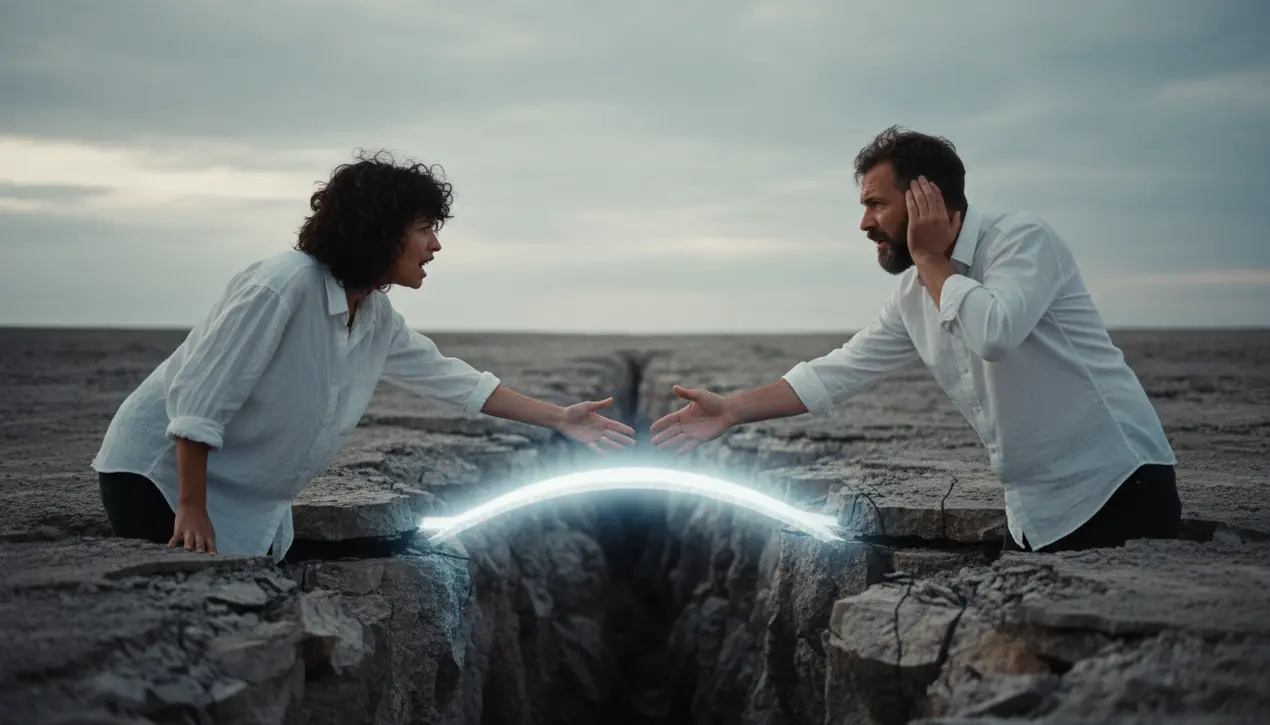
Scienceneuroscience
Bridging the Divide: A Rogerian Approach to Healing Communication Breakdowns
LA
Laura Bennett
10 hours ago7 min read2 comments
It begins with a spark of connection, a feeling of being perfectly understood. Yet, this harmony often gives way to a stark realization: two people are experiencing the same shared reality in profoundly different ways.Suddenly, they are on opposite sides of a chasm, debating what is real. This communication breakdown is a universal human experience, as intimate as it is distressing.So, how do we rebuild the bridge when it starts to crumble? In 1951, against the tense backdrop of the Cold War, the influential psychologist Carl R. Rogers presented a groundbreaking framework at the Centennial Conference on Communications.Rogers, whose person-centered approach transformed therapy, believed the principles that could prevent global conflict were the same ones needed to mend fractures in our personal relationships. His central thesis was deceptively simple yet profoundly challenging: genuine communication flourishes with unconditional positive regard.This isn't about passive agreement; it's about actively creating a psychological sanctuary where the other person feels safe enough to express their true self, free from the immediate threat of judgment or rebuttal. Reflect on your last significant disagreement.Were you listening to comprehend the other person's emotional world and core beliefs, or were you merely waiting for your turn to speak, meticulously constructing your rebuttal? We often enter conversations with a primary goal: to be understood. Rogers advocated for a radical shift from this evaluative stance to a receptive one.He identified our innate tendency to judge, approve, or disapprove from our own perspective as the primary barrier to connection. To repair a rupture, we must first lay down our rhetorical weapons.This involves the disciplined practice of active listening—paraphrasing what you've heard to ensure accurate understanding—and striving to empathically grasp the other person's internal world as if it were your own, all while maintaining the crucial 'as if' distance. It's about validating the emotion behind the words, even when you disagree with the specific content.In therapeutic work with couples, this Rogerian method proves its power. Consider a partner who feels criticized for their long work hours, while the other feels dismissed in their loneliness.They were locked in a battle over whose reality was more valid—his ambition versus her need for connection. The turning point wasn't a negotiated compromise on time management.It emerged when they practiced restating the other's position without defense. He said, 'So, when I work late, you experience it not as me choosing my career, but as me rejecting you.' She replied, 'And you feel that my complaints about your hours are an attack on your efforts to provide for our family, which is how you show love. ' In that moment of being truly heard, the conflict dissolved, making space for genuine collaboration.This is not a simple trick but a sustained practice of emotional courage. It demands vulnerability, requires us to suspend our ego, and challenges us to accept that another's truth can coexist with our own without diminishing it.In an era of deepening polarization, from national politics to kitchen-table disputes, Rogers' wisdom has never been more critical. The gap between us doesn't have to be permanent. It can be bridged by the quiet, determined work of listening with the sole intent to understand—a lesson as vital for saving a personal relationship as it was for attempting to save a world on the brink.
#communication
#psychology
#Carl Rogers
#relationships
#conflict resolution
#featured
Stay Informed. Act Smarter.
Get weekly highlights, major headlines, and expert insights — then put your knowledge to work in our live prediction markets.
Related News
Comments
Loading comments...
© 2025 Outpoll Service LTD. All rights reserved.